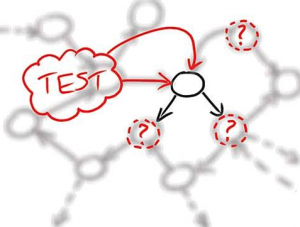
The article presents quick code example for doing unit testing with JUnit & Mockito mocking framework. It also represents unit testing naming convention where features text is used for naming the test methods thereby representing test class as alternate documentation for the class under test.
Following is done while defining Mock member variables
- Use @Mock annotation ahead of member variable definitions
Following are steps done in the setup method:
- Initialize the mock using MockitoAnnotations.initMocks(this);
- Object of class under test is initialized with the mock objects
Following steps are used in each of the unit test methods:
- Create/Initialize required objects for working with mocks and methods under test
- Set the mock behavior on dependent objects
- Execute the method under test
- Perform assertions
- Verify the program execution path by checking on whether a method is invoked or not
The code below represents the class under test and the unit test written to test the class. Take a look the unit test names which represents the card creation function and the scenarios in which it would pass or fail. Following are names. These are unlike the unit test names which uses the function name with state and execution result. I find it easy to understand the unit tests in this way.
- cardIsNotCreatedIfMandatoryUserDetailsNotProvided
- cardIsNotCreatedIfCardFailedToPersistInDatabase
- cardIsCreatedIfAllBusinessRulesAreSatisfied
Class Under Test
public CPResult createCard( Card card ) {
CPResult cpResult = new CPResult();
if( card != null ) {
boolean validated = cdValidator.validate( card );
if( validated ) {
boolean cardCreated = cardDAO.createCard( card );
if( !cardCreated ) {
cpResult.setMessage( CPResult.CARD_PERSISTENCE_FAILURE_MESSAGE );
}
} else {
cpResult.setMessage( CPResult.CARD_VALIDATION_FAILURE_MESSAGE );
}
} else {
cpResult.setMessage( CPResult.CARD_FATAL_ERROR_MESSAGE );
}
if( cpResult.getMessage() != null ) {
cpResult.setStatus( CPResult.CARD_OPERATION_FAILURE );
}
return cpResult;
}
Unit Test Class
public class PrepaidCardProcessorTest {
private PrepaidCardProcessor prepaidCP;
@Mock private CardDetailsValidator cdValidator;
@Mock private CardDAO cardDAO;
@Before
public void setUp() throws Exception {
MockitoAnnotations.initMocks(this);
prepaidCP = new PrepaidCardProcessor();
prepaidCP.setCdValidator( cdValidator );
prepaidCP.setCardDAO( cardDAO );
}
@After
public void tearDown() throws Exception {
}
@Test
public void cardIsNotCreatedIfMandatoryUserDetailsNotProvided() {
// Create required objects for working with mocks and methods under test
//
Card card = new Card();
// Set the mock behavior on dependent objects
//
Mockito.when( cdValidator.validate( card ) ).thenReturn( false );
// Execute the method under test
//
CPResult cpresult = prepaidCP.createCard( card );
// Perform assertions
//
assertTrue( cpresult.getStatus() == CPResult.CARD_OPERATION_FAILURE );
assertTrue( cpresult.getMessage().equals( CPResult.CARD_VALIDATION_FAILURE_MESSAGE ) );
// Verify the program execution path by checking on whether a method is invoked or not
//
Mockito.verify(cdValidator).validate(card);
Mockito.verify(cardDAO, Mockito.never() ).createCard( card );
}
@Test
public void cardIsNotCreatedIfCardFailedToPersistInDatabase() {
// Create required objects for working with mocks and methods under test
//
Card card = new Card();
// Set the mock behavior on dependent objects
//
Mockito.when( cdValidator.validate( card ) ).thenReturn( true );
Mockito.when( cardDAO.createCard( card ) ).thenReturn( false );
// Execute the method under test
//
CPResult cpresult = prepaidCP.createCard( card );
// Perform assertions
//
assertTrue( cpresult.getStatus() == CPResult.CARD_OPERATION_FAILURE );
assertTrue( cpresult.getMessage().equals( CPResult.CARD_PERSISTENCE_FAILURE_MESSAGE ) );
// Verify the program execution path by checking on whether a method is invoked or not
//
Mockito.verify(cdValidator).validate(card);
Mockito.verify(cardDAO ).createCard( card );
}
@Test
public void cardIsCreatedIfAllBusinessRulesAreSatisfied() {
// Create required objects for working with mocks and methods under test
//
Card card = new Card();
// Set the mock behavior on dependent objects
//
Mockito.when( cdValidator.validate( card ) ).thenReturn( true );
Mockito.when( cardDAO.createCard( card ) ).thenReturn( true );
// Execute the method under test
//
CPResult cpresult = prepaidCP.createCard( card );
// Perform assertions
//
assertTrue( cpresult.getStatus() == CPResult.CARD_OPERATION_SUCCESS );
assertNull( cpresult.getMessage() );
// Verify the program execution path by checking on whether a method is invoked or not
//
Mockito.verify(cdValidator).validate(card);
Mockito.verify(cardDAO ).createCard( card );
}
}
…
[adsenseyu1]
- Three Approaches to Creating AI Agents: Code Examples - June 27, 2025
- What is Embodied AI? Explained with Examples - May 11, 2025
- Retrieval Augmented Generation (RAG) & LLM: Examples - February 15, 2025
I found it very helpful. However the differences are not too understandable for me